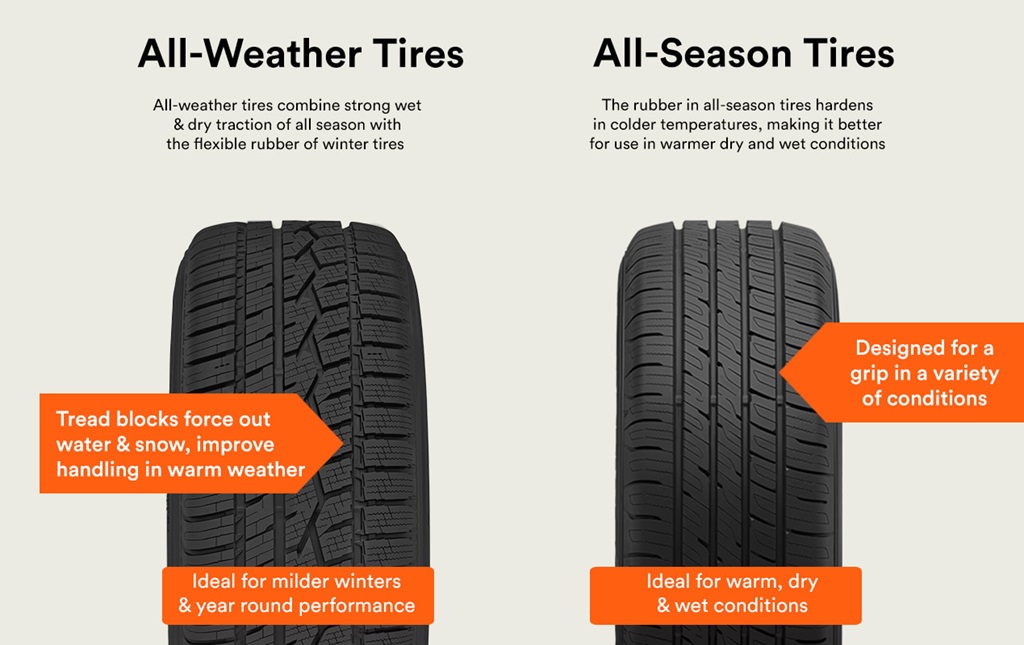Choosing the right tires for your vehicle is a crucial decision that directly impacts your safety and driving experience. In this comprehensive guide, we will delve into the nuances of All-Season and All-Weather tires, exploring their differences and helping you make an informed choice.
Tread Design and Performance
Tread Patterns in All-Season Tires
All-season tires boast a versatile tread design, intended to provide satisfactory performance across various weather conditions. The symmetrical tread patterns often feature notched shoulders for improved traction.
Tread Patterns in All-Weather Tires
On the other hand, All-Weather tires combine the best of both worlds with a tread pattern designed for year-round use. Their asymmetrical patterns include wider grooves for efficient water evacuation.
Performance in Dry Conditions
All-season tires excel in dry conditions, delivering a smooth and comfortable ride. The solid center rib enhances stability during straight-line driving, making them a reliable choice for city commuting.
Performance in Wet Conditions
All-weather tires shine in wet conditions, thanks to their intricate tread patterns and siping that channel water away. This feature significantly reduces the risk of hydroplaning, ensuring a safer drive during heavy rain.
Winter Conditions Handling
All-Season Tire Limitations in Winter

All-season tires face limitations in handling extreme winter conditions. The rubber compound tends to harden in cold temperatures, resulting in decreased flexibility and traction on icy or snowy roads.
All-Weather Tire Adaptability in Winter
All-weather tires, however, showcase adaptability in winter. Their rubber compound remains pliable in cold temperatures, providing enhanced grip and traction. This makes them a suitable choice for regions with milder winter climates.
Traction and Braking Comparison
In terms of traction and braking, All-Weather tires outperform All-Season tires in winter conditions. The ability to maintain flexibility in colder temperatures translates to better control on slippery surfaces.
Temperature Sensitivity
All-Season Tire Temperature Range
All-season tires operate optimally in moderate temperatures, making them suitable for spring, summer, and fall. Extreme cold or hot conditions can affect their performance, emphasizing the need for seasonal adjustments.
All-Weather Tire Temperature Range
All-weather tires showcase a broader temperature range, offering reliable performance in both cold and warm climates. This versatility makes them a convenient choice for drivers who want year-round functionality without compromising safety.
Impact on Tire Performance
Temperature sensitivity directly impacts tire performance. All-season tires might experience reduced traction and responsiveness outside their ideal temperature range, affecting handling and braking capabilities.
Longevity and Durability
All-Season Tire Lifespan
All-season tires typically have a longer lifespan compared to their All-Weather counterparts. The rubber composition and tread design contribute to durability, offering extended use before replacement is necessary.
All-Weather Tire Durability
While All-Weather tires may not match the longevity of All-Season tires, advancements in tire technology have significantly improved their durability. Regular maintenance and proper care can maximize their lifespan.
Factors Influencing Tire Longevity
Factors like driving habits, road conditions, and maintenance routines play a crucial role in determining tire longevity. Regular tire rotations, proper inflation, and avoiding aggressive driving contribute to prolonged tire life.
Cost Considerations
Upfront Costs of All-Season and All-Weather Tires
All-weather tires generally come with a higher upfront cost compared to All-Season tires. This initial investment might deter some buyers, but it’s essential to consider the long-term savings and benefits.
Long-Term Savings and Investment
All-weather tires prove to be a cost-effective choice in the long run, especially for those living in regions with unpredictable weather. The year-round functionality reduces the need for seasonal tire changes, saving both time and money.
Consumer Preferences and Driving Habits
Matching Tires to Driving Needs

Consumer satisfaction depends on aligning tire choice with individual driving needs. Those who prioritize performance in specific conditions may lean towards specialized tires, while others value the convenience of a year-round option.
Survey Results on Consumer Satisfaction
Surveys indicate a varied level of satisfaction with both All-Season and All-Weather tires. It often boils down to individual preferences and experiences, highlighting the importance of understanding personal driving habits.
Case Studies on Driving Habits
Examining case studies of drivers with different habits sheds light on the practical implications of tire choices. Real-world scenarios provide valuable insights for potential buyers looking to make an informed decision.
Environmental Impact
All-season and All-Weather Tire Eco-Friendliness
Both tire types have environmental implications. All-season tires might require more frequent replacements, contributing to increased waste. All-weather tires, while more durable, still require proper disposal methods to minimize their impact.
Recycling Options for Both Tire Types
Recycling initiatives play a crucial role in minimizing the environmental impact of tires. Researching local recycling options ensures responsible disposal, reducing the ecological footprint of tire usage.
Carbon Footprint Comparison
Considering the carbon footprint of tire production and disposal adds another layer to the environmental discussion. Analyzing the overall impact aids environmentally conscious consumers in making eco-friendly choices.
Brand and Model Variations
Popular Brands for All-Season Tires
Exploring renowned brands for All-Season tires provides consumers with a starting point for their research. Factors like reputation, customer reviews, and industry ratings contribute to making an informed decision.
Popular Brands for All-Weather Tires
Similarly, identifying popular brands for All-Weather tires allows consumers to narrow down their options. Researching specific models and customer feedback aids in finding the most suitable tire for individual needs.
Model Comparisons Within Each Type
Within each tire type, there are various models with distinct features. Comparing these models based on performance, longevity, and consumer reviews helps buyers make a more tailored decision.
Maintenance Tips
All-Season Tire Care Guidelines
Proper maintenance ensures optimal performance and longevity for All-Season tires. Regular tire rotations, alignment checks, and monitoring of tread depth contribute to a safer and smoother driving experience.
All-Weather Tire Maintenance Tips
Maintaining All-Weather tires involves similar practices, with a focus on adapting to changing weather conditions. Checking tire pressure, inspecting tread wear, and scheduling regular inspections contribute to overall tire health.
Real-Life Experiences
Customer Testimonials
Real-life experiences from customers who have used both All-Season and All-Weather tires provide valuable insights. Understanding their challenges and preferences aids potential buyers in making a decision aligned with their needs.
Personal Anecdotes and Experiences
Personal anecdotes from drivers who have faced specific weather challenges or road conditions offer a relatable perspective. These stories highlight the practical aspects of tire performance in various scenarios.
Expert Recommendations

Insights from Tire Experts
Gaining insights from tire experts and industry professionals adds a layer of authority to the decision-making process. Expert recommendations consider factors like tire technology, performance metrics, and industry trends.
Industry Trends and Advancements
Staying updated on industry trends and advancements ensures that consumers make choices aligned with the latest innovations. Advancements in tire technology may introduce features that cater to specific driving needs.
Conclusion
In conclusion, the choice between All-Season and All-Weather tires boils down to individual preferences, driving habits, and regional climate. Both tire types have their strengths and limitations, and understanding these nuances is crucial for making an informed decision.
FAQs
Q1: Are All-Season tires suitable for extreme winter conditions?
All-season tires have limitations in extreme winter conditions due to their rubber compound hardening in cold temperatures. Consider specialized winter tires for optimal performance in harsh winter climates.
Q2: Can I use All-Weather tires year-round?
Yes, All-Weather tires are designed for year-round use, providing a convenient option for drivers who want consistent performance in various weather conditions.
Q3: Do All-Weather tires compromise on dry road performance?
No, all-weather tires are engineered to provide balanced performance on both dry and wet surfaces. Their tread design ensures reliable traction and braking in various conditions.
Q4: Are All-Season tires a cost-effective choice?
While All-Season tires have a lower upfront cost, All-Weather tires prove to be a cost-effective choice in the long run, considering their year-round functionality and reduced need for seasonal changes.
Q5: How often should tire maintenance be performed?
Regular tire maintenance, including rotations, alignment checks, and inspections, should be performed every 6 months or as recommended by the vehicle manufacturer to ensure optimal performance and safety.








